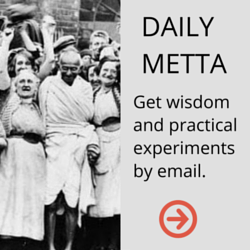June 20:
 “I will give you a talisman. Whenever you are in doubt, or when the self becomes too much with you, apply the following test. Recall the face of the poorest and the weakest man [woman] whom you may have seen, and ask yourself, if the step you contemplate is going to be of any use to him [her]. Will he [she] gain anything by it? Will it restore him [her] to a control over his [her] own life and destiny? In other words, will it lead to swaraj [freedom] for the hungry and spiritually starving millions?
“I will give you a talisman. Whenever you are in doubt, or when the self becomes too much with you, apply the following test. Recall the face of the poorest and the weakest man [woman] whom you may have seen, and ask yourself, if the step you contemplate is going to be of any use to him [her]. Will he [she] gain anything by it? Will it restore him [her] to a control over his [her] own life and destiny? In other words, will it lead to swaraj [freedom] for the hungry and spiritually starving millions?
Then you will find your doubts and your self melt away.”
—Gandhi (Last Phase, Vol. II (1958), P. 65)
In 2001, the United Nations declared June 20th “World Refugee Day.” According to the UN’s 1951 Refugee Convention, a refugee is a person who has fled their country due to “a well-founded fear of persecution because of his/her race, religion, nationality, membership in a particular social group, or political opinion.” It also includes other forcibly displaced persons, including “internally displaced persons,” (IDPS) persons who have fled their home areas, but remain within their country; “asylum seekers,” those for whom their refugee status remains unacknowledged; and “stateless persons,” those who have no country, usually due to ethnic discrimination. People can become refugees for environmental as well as human causes, and according to a 2011 study, 46 percent of refugees or those in “refugee-like” situations are children. And sadly, every minute, eight people are forcibly displaced somewhere in our world. Gandhi in his ever-practical way would tell us that we can put an end to this situation once and for all if we have the perseverance, the patience, and the daring to try.
Besides ensuring that the rights and needs of those who have been forcibly displaced are respected and upheld, we can do something else on this day: we can recommit ourselves to building a nonviolent society, keeping in mind Gandhi’s talisman: Will the choice I am about to make negatively or positively impact those who have been forcibly displaced? What can I do today that will benefit those who have been forced to flee their homes? Such thinking gets us out of despair and puts it to use by strengthening our collective will and determination to change and repair the circumstances and short-sighted decisions that negatively impact those around us, even if we have never met them. We must, to quote Jesus, “love the stranger.” How to put this into action? Concretely, we can work to support and institutionalize unarmed peacekeeping and nonviolent alternatives to local, national and international methods of violent conflict. Resisting, replacing and ending war would be a huge step in the right direction of interrupting the violence of displacement.
Experiment in Nonviolence:
Make a commitment today to work toward ending the violence of displacement worldwide.
 Daily Metta 2015, a service of the Metta Center for Nonviolence, is a daily reflection on the strategic and spiritual insights of Mahatma Gandhi in thought, word and deed. As Gandhi called his life an “experiment in truth,” we have included an experiment in nonviolence to accompany each Daily Metta. Check in every day for new inspiration. Each year will be dedicated to another wisdom teacher.
Daily Metta 2015, a service of the Metta Center for Nonviolence, is a daily reflection on the strategic and spiritual insights of Mahatma Gandhi in thought, word and deed. As Gandhi called his life an “experiment in truth,” we have included an experiment in nonviolence to accompany each Daily Metta. Check in every day for new inspiration. Each year will be dedicated to another wisdom teacher.








